陕西省黄陵中学高新部2017-2018学年高一下学期期中考试英语试题 Word版含答案
2017-2018学年陕西省黄陵中学高一(普通班)4月月考英语试题 Word版含答案

高一普通班学月考试英语试题第Ⅰ卷(选择题,共100分)第一部分:听力(共两节,满分30分)第一节听下面5段对话。
每段对话后有一个小题,从题中所给的A、B、C三个选项中选出最佳选项,并标在试卷的相应位置。
听完每段对话后,你都有10秒钟的时间来回答有关小题和阅读下一小题。
每段对话仅读一遍。
例: How much is the shirt?A. £19.15 .B. £9.18.C. £9.15.答案是C。
1. Where does the conversation probably take place?A. In a restaurant.B. In a clothes stores.C. In a hotel.2. What is the possible relationship between the speakers?A. Employer and employee.B. Next door neighbors.C. Two good friends.3. What time will the woman leave?A. At 11:00 tonight.B. At 6:10 tomorrow morning.C. At 11:00 tomorrow morning.4. What will the woman do for the man?A. Get him some fruit.B. Wash his clothes.C. Take him to the supermarket.5. What will the speakers most probably do this weekend?A. See a film.B. Climb a mountain.C. Play table tennis.第二节(共15小题;每小题1.5分,满分22.5分)听下面5段对话或独白。
2017-2018学年陕西省黄陵中学高新部高一6月月考英语试题
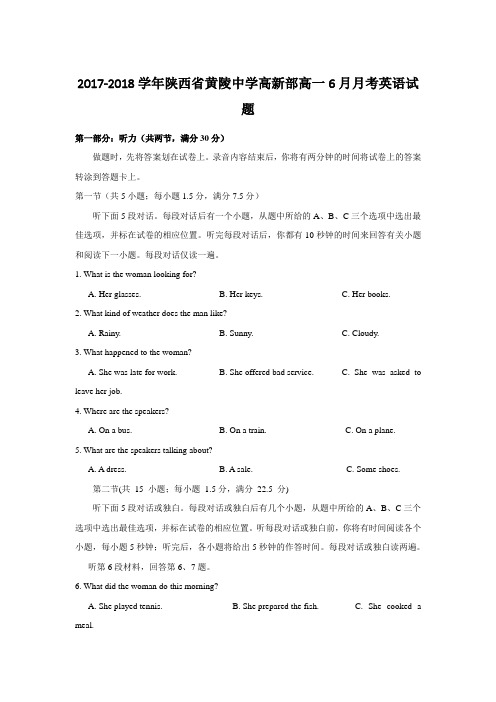
2017-2018学年陕西省黄陵中学高新部高一6月月考英语试题第一部分:听力(共两节,满分30分)做题时,先将答案划在试卷上。
录音内容结束后,你将有两分钟的时间将试卷上的答案转涂到答题卡上。
第一节(共5小题;每小题1.5分,满分7.5分)听下面5段对话。
每段对话后有一个小题,从题中所给的A、B、C三个选项中选出最佳选项,并标在试卷的相应位置。
听完每段对话后,你都有10秒钟的时间来回答有关小题和阅读下一小题。
每段对话仅读一遍。
1. What is the woman looking for?A. Her glasses.B. Her keys.C. Her books.2. What kind of weather does the man like?A. Rainy.B. Sunny.C. Cloudy.3. What happened to the woman?A. She was late for work.B. She offered bad service.C. She was asked to leave her job.4. Where are the speakers?A. On a bus.B. On a train.C. On a plane.5. What are the speakers talking about?A. A dress.B. A sale.C. Some shoes.第二节(共15 小题;每小题 1.5分,满分22.5 分)听下面5段对话或独白。
每段对话或独白后有几个小题,从题中所给的A、B、C三个选项中选出最佳选项,并标在试卷的相应位置。
听每段对话或独白前,你将有时间阅读各个小题,每小题5秒钟;听完后,各小题将给出5秒钟的作答时间。
每段对话或独白读两遍。
听第6段材料,回答第6、7题。
6. What did the woman do this morning?A. She played tennis.B. She prepared the fish.C. She cooked a meal.7. What will the man put on the table?A. Glasses.B. Knives.C. Forks.听第7段材料,回答第8、9题。
陕西省黄陵中学20172018学年高一重点班下学期开学考试英语试卷

高一重点班开学考试英语试题第I卷第一部分:听力部分第一节(共5小题;每小题1.5分,满分7.5分)听下面5段对话。
每段对话后有一个小题,从题中所给的A、B、C三个选项中选出最佳选项,并标在试卷的相应位置。
听完每段对话后,你都有10秒钟的时间来回答有关小题和阅读下一小题。
每段对话仅读一遍。
1. What are the speakers talking about?A. Having a birthday party.B. Doing some exercise.C. Getting Lydia a gift.2. What is the woman going to do?A. Help the man.B. Take a bus.C. Get a camera.3. What does the woman suggest the man do?A. Tell Kate to stop.B. Call Kate’s friends.C. Stay away from Kate.4. Where does the conversation probably take place?A. In a wine shop.B. In a supermarket.C. In a restaurant.5. What does the woman mean?A. Keep the window closed.B. Go out for fresh air.C. Turn on the fan.第二节(共15小题;每小题1.5分,满分22.5分)听下面5段对话或独白。
每段对话或独白后有几个小题,从题中所给的A、B、C三个选项中选出最佳选项,并标在试卷的相应位置。
听每段对话或独白前,你将有时间阅读各个小题,每小题5秒钟;听完后,各小题将给出5秒钟的作答时间。
每段对话或独白读两遍。
听第6段材料,回答第6、7题。
6. What is the man going to do this summer?A. Teach a course.B. Repair his house.C. Work at a hotel.7. How will the man use the money?A. To hire a gardener.B. To buy books.C. To pay for a boat trip.听第7段材料,回答第8、9题。
陕西省黄陵中学2017-2018学年高一第二学期6月月考英语试卷(普通班)
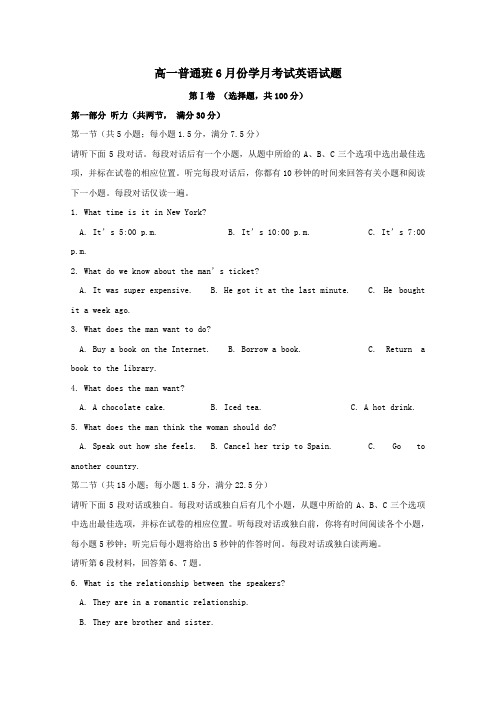
高一普通班6月份学月考试英语试题第Ⅰ卷(选择题,共100分)第一部分听力(共两节,满分30分)第一节(共5小题;每小题1.5分,满分7.5分)请听下面5段对话。
每段对话后有一个小题,从题中所给的A、B、C三个选项中选出最佳选项,并标在试卷的相应位置。
听完每段对话后,你都有10秒钟的时间来回答有关小题和阅读下一小题。
每段对话仅读一遍。
1. What time is it in New York?A. It’s 5:00 p.m.B. It’s 10:00 p.m.C. It’s 7:00 p.m.2. What do we know about the man’s ticket?A. It was super expensive.B. He got it at the last minute.C. He bought it a week ago.3. What does the man want to do?A. Buy a book on the Internet.B. Borrow a book.C. Return a book to the library.4. What does the man want?A. A chocolate cake.B. Iced tea.C. A hot drink.5. What does the man think the woman should do?A. Speak out how she feels.B. Cancel her trip to Spain.C. Go to another country.第二节(共15小题;每小题1.5分,满分22.5分)请听下面5段对话或独白。
每段对话或独白后有几个小题,从题中所给的A、B、C三个选项中选出最佳选项,并标在试卷的相应位置。
听每段对话或独白前,你将有时间阅读各个小题,每小题5秒钟;听完后每小题将给出5秒钟的作答时间。
英语-陕西省黄陵中学2017-2018学年高一下(重点班)6月月考试题

陕西省黄陵中学2017-2018学年高一下(重点班)6月月考英语试题第Ⅰ卷(选择题,共100分)第一部分听力(共两节,满分30分)第一节:听下面五段对话。
每段对话后有一个小题,从题中所给的A,B,C三个选项中选出最佳选项,并标在试卷的相应位置。
听完每段对话后,你都有10秒钟的时间来回答有关小题和阅读下一小题。
每段对话仅读一遍。
1. Where is the pillow?A .On the bed B. Under the blanket C. On the chair2.What present does the man give to the woman?A. A plantB. FlowersC. A CD3.What are the speakers talking about?A. Who will go to the museum.B. When they will go to the museum.C. Whether their father will work this week.4. What are the speakers doing?A. Making a schedule.B. Planning for a meeting.C. Waiting for a train.5.What do the speakers agree about Victor?A. He plays well in the band.B. He makes wonderful videos.C. He is easy to get along with.第二节:听下面五段对话或独白。
每段对话或独白后有几个小题,从题中所给的A,B,C 三个选项中选出最佳选项,并标在试卷的相应位置。
听每段对话或独白前,你将有时间阅读各个小题,每小题5秒钟;听完后,各个小题将给出5秒钟的作答时间。
每段对话或独白读两遍。
2017-2018学年陕西省黄陵中学高新部高一6月月考英语试题

2017-2018学年陕西省黄陵中学高新部高一6月月考英语试题第一部分:听力(共两节,满分30分)做题时,先将答案划在试卷上。
录音内容结束后,你将有两分钟的时间将试卷上的答案转涂到答题卡上。
第一节(共5小题;每小题1.5分,满分7.5分)听下面5段对话。
每段对话后有一个小题,从题中所给的A、B、C三个选项中选出最佳选项,并标在试卷的相应位置。
听完每段对话后,你都有10秒钟的时间来回答有关小题和阅读下一小题。
每段对话仅读一遍。
1. What is the woman looking for?A. Her glasses.B. Her keys.C. Her books.2. What kind of weather does the man like?A. Rainy.B. Sunny.C. Cloudy.3. What happened to the woman?A. She was late for work.B. She offered bad service.C. She was asked to leave her job.4. Where are the speakers?A. On a bus.B. On a train.C. On a plane.5. What are the speakers talking about?A. A dress.B. A sale.C. Some shoes.第二节(共15 小题;每小题 1.5分,满分22.5 分)听下面5段对话或独白。
每段对话或独白后有几个小题,从题中所给的A、B、C三个选项中选出最佳选项,并标在试卷的相应位置。
听每段对话或独白前,你将有时间阅读各个小题,每小题5秒钟;听完后,各小题将给出5秒钟的作答时间。
每段对话或独白读两遍。
听第6段材料,回答第6、7题。
6. What did the woman do this morning?A. She played tennis.B. She prepared the fish.C. She cooked a meal.7. What will the man put on the table?A. Glasses.B. Knives.C. Forks.听第7段材料,回答第8、9题。
【精编文档】陕西省黄陵中学2018-2019学年高一英语下学期期中试卷重点班.doc

陕西省黄陵中学2018-2019学年高一英语下学期期中试题(重点班)第I卷(选择题共100分)第一部分:听力(共两节,满分30分)第一节(共5小题;每小题1.5分;满分7.5分)听下面5段对话。
每段对话后有一个小题,从题中所给的A、B、C三个选项中选出最佳选项,并标在试卷的相应位置。
听完每段对话后,你都有10秒钟的时间来回答有关小题和阅读下一小题。
每段对话仅读一遍。
1. When does Tom's party begin?A. At 3:30.B. At 7:00.C. At7:30.2. What does the woman want to do?A. Watch a CD.B. Attend a birthday partyC. See her present3. Where does the conversation take place?A. At a bookstore.B. At a library.C. At a zoo.4. What are the speakers talking about?A. Who will go to the museum.B. When they will go to the museum,C. Whether their father will work this week.5. Why does the man call the woman?A. To book a room.B. To get some medicine.C. To make an appointment.第二节(共15题;每小题1.5分,满分22.5分)听下面5段对话或独白。
每段对话或独白后有几个小题,从题中所给的A、B、C三个选项中选出最佳选项,并标在试卷的相应位置。
听每段对话或独白前,你将有时间阅读各个小题,每小题5秒钟;听完后,各小题将给出5秒钟的作答时间。
陕西省黄陵中学2018届高三(高新部)下学期第一次大检测英语试卷

高新部高三2018年第一次质量大检测英语试题第Ⅰ卷(选择题,共100分)第一部分:听力(共两节,满分30分)第一节听下面5段对话。
每段对话后有一个小题,从题中所给的A、B、C三个选项中选出最佳选项,并标在试卷的相应位置。
听完每段对话后,你都有10秒钟的时间来回答有关小题和阅读下一小题。
每段对话仅读一遍。
1. What does the woman like best?A. Water.B. Coffee.C. Tea.2. What are die speakers talking about?A. A market research.B. A job interview.C. An exam paper.3. What was the woman doing?A. Looking for something.B. Admiring a building.C. Selling flowers.4. What will the man probably do?A. Prepare for a test.B. Go to meet friends.C. Rest at home.5. What did the man buy yesterday?A. Shirts.B. Trousers.C. Shoes.第二节(共15小题;每小题1.5分,满分22.5分)听下面5段对话或独白。
每段对话或独白后有几个小题,从每题所给的A、B、C三个选项中选出最佳选项,并标在试卷的相应位置。
听每段对话或独白前,你将有时间阅读各个小题,每小题5秒钟;听完后,各小题将给出5秒钟的作答时间。
每段对话或独白读两遍。
听第6段材料,回答第6至7题。
6. How is the man probably feeling now?A. Sorry.B. Angry.C. Worried.7. What does the woman want to do?A. Try on some new dresses.B. Wait outside with friends.C. Buy the man something.听第7段材料,回答第8至9题。
2018届陕西省黄陵中学(高新部)高三下学期开学考试英语试题word版含答案
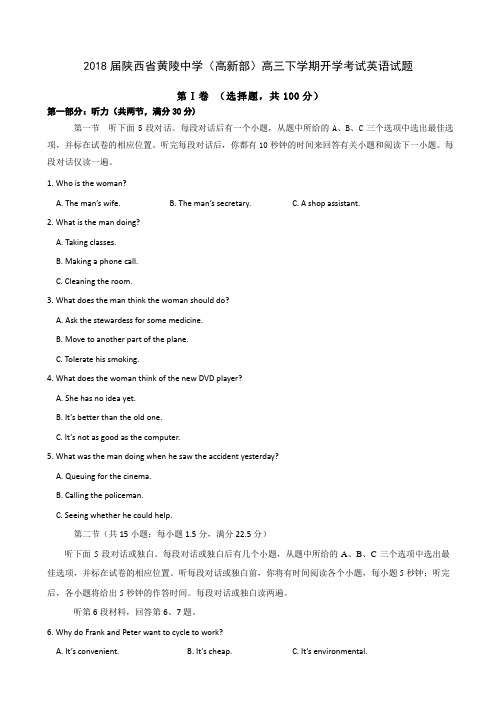
2018届陕西省黄陵中学(高新部)高三下学期开学考试英语试题第Ⅰ卷(选择题,共100分)第一部分:听力(共两节,满分30分)第一节听下面5段对话。
每段对话后有一个小题,从题中所给的A、B、C三个选项中选出最佳选项,并标在试卷的相应位置。
听完每段对话后,你都有10秒钟的时间来回答有关小题和阅读下一小题。
每段对话仅读一遍。
1. Who is the woman?A. The man’s wife.B. The man’s secretary.C. A shop assistant.2. What is the man doing?A. Taking classes.B. Making a phone call.C. Cleaning the room.3. What does the man think the woman should do?A. Ask the stewardess for some medicine.B. Move to another part of the plane.C. Tolerate his smoking.4. What does the woman think of the new DVD player?A. She has no idea yet.B. It’s better than the old one.C. It’s not as good as the computer.5. What was the man doing when he saw the accident yesterday?A. Queuing for the cinema.B. Calling the policeman.C. Seeing whether he could help.第二节(共15小题;每小题1.5分,满分22.5分)听下面5段对话或独白。
每段对话或独白后有几个小题,从题中所给的A、B、C三个选项中选出最佳选项,并标在试卷的相应位置。
陕西省黄陵中学2017-2018学年高一英语下学期期末考试试题(普通班)

陕西省黄陵中学2017-2018学年高一英语下学期期末考试试题(普通班)第I卷第一卷选择题(共60题,100分)一、听力第一节(每小题1.5分,满分7.5分)听下面5段对话。
每段对话后有一个小题,从题中所给的A,B,C三个选项中选出最佳选项,并标在试卷的相应位置。
听完每段对话后,你都有10秒钟的时间来回答有关小题和阅读下一小题。
每段对话仅读一遍。
1. How old is the woman’s bicycle?A. Three years old.B. Four years old.C. Five years old.2. What are the speakers mainly talking about?A. The football.B. The money.C. The birthday.3. What would Mr.Wolf like to drink?A. A coke.B. A cold beer.C. Nothing.4. Where are the speakers?A. In the woman’s house.B. In a shop.C. In a hotel.5. What does the man mean?A. He likes to put money in the bank because of security(安全).B. He doesn’t like to put money in the bank at all.C. He likes to put money in the bank because it has no risk.第二节(每小题1.5分,满分22.5分)听下面5段对话。
每段对话后有几个小题,从题中所给的A,B,C三个选项中选出最佳选项,并标在试卷的相应位置。
听每段对话前,你将有时间阅读各个小题,每小题5秒钟;听完后,各小题将给出5秒钟的作答时间。
陕西省黄陵中学2017_2018学年高一英语下学期期末考试试题普通班2018072701196

陕西省黄陵中学2017-2018学年高一英语下学期期末考试试题(普通班)第I卷第一卷选择题(共60题,100分)一、听力第一节(每小题1.5分,满分7.5分)听下面5段对话。
每段对话后有一个小题,从题中所给的A,B,C三个选项中选出最佳选项,并标在试卷的相应位置。
听完每段对话后,你都有10秒钟的时间来回答有关小题和阅读下一小题。
每段对话仅读一遍。
1. How old is the woman’s bicycle?A. Three years old.B. Four years old.C. Five years old.2. What are the speakers mainly talking about?A. The football.B. The money.C. The birthday.3. What would Mr.Wolf like to drink?A. A coke.B. A cold beer.C. Nothing.4. Where are the speakers?A. In the woman’s house.B. In a shop.C. In a hotel.5. What does the man mean?A. He likes to put money in the bank because of security(安全).B. He doesn’t like to put money in the bank at all.C. He likes to put money in the bank because it has no risk.第二节(每小题1.5分,满分22.5分)听下面5段对话。
每段对话后有几个小题,从题中所给的A,B,C三个选项中选出最佳选项,并标在试卷的相应位置。
听每段对话前,你将有时间阅读各个小题,每小题5秒钟;听完后,各小题将给出5秒钟的作答时间。
2017-2018学年高一英语下学期期中试题(普通班)
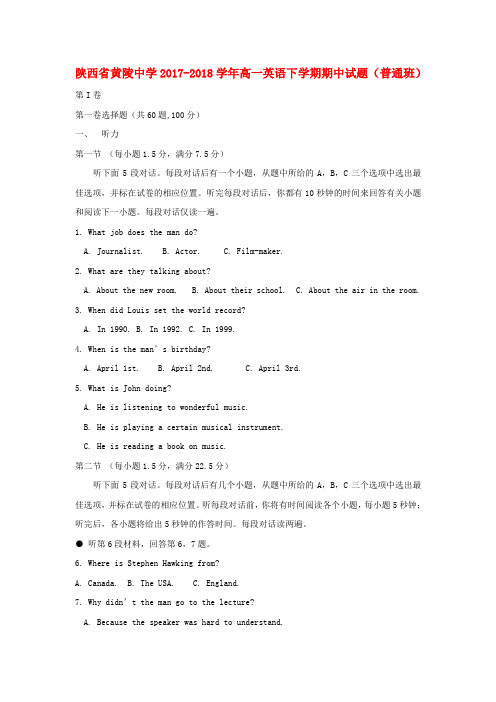
陕西省黄陵中学2017-2018学年高一英语下学期期中试题(普通班)第I卷第一卷选择题(共60题,100分)一、听力第一节(每小题1.5分,满分7.5分)听下面5段对话。
每段对话后有一个小题,从题中所给的A,B,C三个选项中选出最佳选项,并标在试卷的相应位置。
听完每段对话后,你都有10秒钟的时间来回答有关小题和阅读下一小题。
每段对话仅读一遍。
1. What job does the man do?A. Journalist.B. Actor.C. Film-maker.2. What are they talking about?A. About the new room.B. About their school.C. About the air in the room.3. When did Louis set the world record?A. In 1990.B. In 1992.C. In 1999.4. When is the man’s birthday?A. April 1st.B. April 2nd.C. April 3rd.5. What is John doing?A. He is listening to wonderful music.B. He is playing a certain musical instrument.C. He is reading a book on music.第二节(每小题1.5分,满分22.5分)听下面5段对话。
每段对话后有几个小题,从题中所给的A,B,C三个选项中选出最佳选项,并标在试卷的相应位置。
听每段对话前,你将有时间阅读各个小题,每小题5秒钟;听完后,各小题将给出5秒钟的作答时间。
每段对话读两遍。
● 听第6段材料,回答第6,7题。
6. Where is Stephen Hawking from?A. Canada.B. The USA.C. England.7. Why didn’t the man go to the lecture?A. Because the speaker was hard to understand.B. Because he was ill and didn’t come to work.C. Because he thought the lecture was not important.● 听第7段材料,回答第8 至9题。
陕西省黄陵县17学年高一英语下学期期中试题
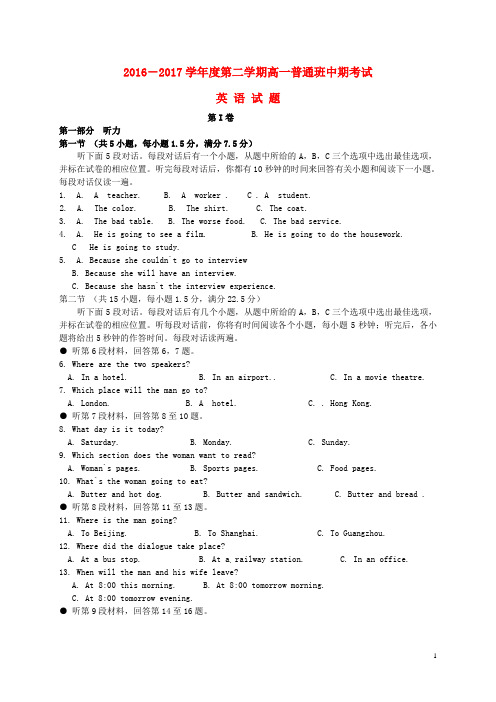
2016-2017学年度第二学期高一普通班中期考试英语试题第I卷第一部分听力第一节(共5小题,每小题1.5分,满分7.5分)听下面5段对话。
每段对话后有一个小题,从题中所给的A,B,C三个选项中选出最佳选项,并标在试卷的相应位置。
听完每段对话后,你都有10秒钟的时间来回答有关小题和阅读下一小题。
每段对话仅读一遍。
1. A. A teacher. B. A worker . C . A student.2. A. The color. B. The shirt. C. The coat.3. A. The bad table. B. The worse food. C. The bad service.4. A. He is going to see a film. B. He is going to do the housework.C He is going to study.5. A. Because she couldn`t go to interviewB. Because she will have an interview.C. Because she hasn`t the interview experience.第二节(共15小题,每小题1.5分,满分22.5分)听下面5段对话。
每段对话后有几个小题,从题中所给的A,B,C三个选项中选出最佳选项,并标在试卷的相应位置。
听每段对话前,你将有时间阅读各个小题,每小题5秒钟;听完后,各小题将给出5秒钟的作答时间。
每段对话读两遍。
●听第6段材料,回答第6,7题。
6. Where are the two speakers?A. In a hotel.B. In an airport..C. In a movie theatre.7. Which place will the man go to?A. London.B. A hotel.C. . Hong Kong.●听第7段材料,回答第8至10题。
陕西省黄陵中学2017-2018学年高一普通班下学期开学考

高一普通班开学考试英语试题第I卷第一部分听力(共两节,20分)第一节(共5小题,每小题1分,满分5分)听下面5段对话。
每段对话后有一个小题,从题中所给的A、B、C三个选项中选出最佳选项,并标在试卷的相应位置。
听完每段对话后,你都有10秒钟的时间来回答有关小题和阅读下一小题。
每段对话仅读一遍。
例:How much is the shirt?A.£19.15. B.£9.15. C.£9.18.答案是B。
21.What is the relationship between the two speakers?A.Teacher and student.B.Employer and employee.C.Doctor and patient.2.What are the two speakers doing?A.Bargaining. B.Quarreling. C.Debating.3.How does the woman buy her clothes?A.On TV. B.Online. C.In shops.4.What are the two speakers talking about?A.Wallet. B.Watch. C.Notebook.5.How old is the man?A.35. B.34. C.31.第二节(共15个小题;每小题1分,满分15分)听下面5段对话或独白,每段对话或独白后有几个小题,从题中所给的A,B,C三个选项中选出最佳选项,并标在试卷的相应位置。
听每段对话或独白前,你将有时间来阅读各个小题,每小题5秒钟;听完后,各小题将给出5秒钟的作答时间。
每段对话或独白读两遍。
听第6段材料,回答第6至7题。
6.What is the survey about?A.Relationship between parents and children.B.Top gift on Mother’s Day.C.The sale of chocolates.7.What gift do most people choose to send to their mothers?A.Flowers. B.Chocolates. C.Time with family.听第7段材料,回答第8至9题。
陕西省黄陵中学2017_2018学年高一英语6月月考试题高新部-含答案 师生通用

高一高新部6月份学月考试英语试题第一部分:听力(共两节,满分30分)做题时,先将答案划在试卷上。
录音内容结束后,你将有两分钟的时间将试卷上的答案转涂到答题卡上。
第一节(共5小题;每小题1.5分,满分7.5分)听下面5段对话。
每段对话后有一个小题,从题中所给的A、B、C三个选项中选出最佳选项,并标在试卷的相应位置。
听完每段对话后,你都有10秒钟的时间来回答有关小题和阅读下一小题。
每段对话仅读一遍。
1. What is the woman looking for?A. Her glasses.B. Her keys.C. Her books.2. What kind of weather does the man like?A. Rainy.B. Sunny.C. Cloudy.3. What happened to the woman?A. She was late for work.B. She offered bad service.C. She was asked to leave her job.4. Where are the speakers?A. On a bus.B. On a train.C. On a plane.5. What are the speakers talking about?A. A dress.B. A sale.C. Some shoes.第二节(共 15 小题;每小题 1.5分,满分 22.5 分)听下面5段对话或独白。
每段对话或独白后有几个小题,从题中所给的A、B、C三个选项中选出最佳选项,并标在试卷的相应位置。
听每段对话或独白前,你将有时间阅读各个小题,每小题5秒钟;听完后,各小题将给出5秒钟的作答时间。
每段对话或独白读两遍。
听第6段材料,回答第6、7题。
6. What did the woman do this morning?A. She played tennis.B. She prepared the fish.C. She cooked a meal.7. What will the man put on the table?A. Glasses.B. Knives.C. Forks.听第7段材料,回答第8、9题。
高一英语下学期期中试题(高新部)(2021年整理)
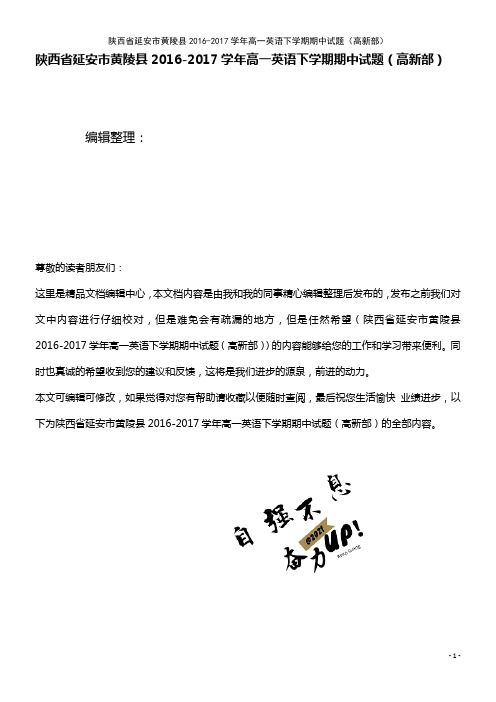
陕西省延安市黄陵县2016-2017学年高一英语下学期期中试题(高新部)编辑整理:尊敬的读者朋友们:这里是精品文档编辑中心,本文档内容是由我和我的同事精心编辑整理后发布的,发布之前我们对文中内容进行仔细校对,但是难免会有疏漏的地方,但是任然希望(陕西省延安市黄陵县2016-2017学年高一英语下学期期中试题(高新部))的内容能够给您的工作和学习带来便利。
同时也真诚的希望收到您的建议和反馈,这将是我们进步的源泉,前进的动力。
本文可编辑可修改,如果觉得对您有帮助请收藏以便随时查阅,最后祝您生活愉快业绩进步,以下为陕西省延安市黄陵县2016-2017学年高一英语下学期期中试题(高新部)的全部内容。
陕西省延安市黄陵县2016—2017学年高一英语下学期期中试题(高新部)第I卷第一部分:听力(共两节,满分30分)第一节 (共5小题;每小题1。
5分,满分7。
5分)听下面5段对话。
每段对话后有一个小题,从题中所给的A、B、C三个选项中选出最佳选项,并标在试卷的相应位置。
听完每段对话后,你都有10秒钟的时间来回答有关小题和阅读下一小题。
每段对话仅读一遍。
1。
What time is it now?A。
9:10。
B。
9:50. C。
10:00。
2.What does the woman think of the weather?A. It’s nice。
B。
It's warm C。
It’s cold3.What will the man do?A. Attend a meeting. B。
Give a lecture. C.Leave his office.4.What is the woman's opinion about the course?A.Too hard.B. worth taking C。
very easy 。
5.What does the woman want the man to do?A.Speak louder. B。
- 1、下载文档前请自行甄别文档内容的完整性,平台不提供额外的编辑、内容补充、找答案等附加服务。
- 2、"仅部分预览"的文档,不可在线预览部分如存在完整性等问题,可反馈申请退款(可完整预览的文档不适用该条件!)。
- 3、如文档侵犯您的权益,请联系客服反馈,我们会尽快为您处理(人工客服工作时间:9:00-18:30)。
高新部高一下学期期中考试英语试题考试时间:120分钟考试分值:150分第一卷第一部分: 听力(共两节,满分30 分)第一节(共5小题;每小题1.5分,满分7.5分)听下面5段对话。
每段对话后有一个小题,从题中所给的A、B、C三个选项中选出最佳选项,并标在试卷的相应位置。
听完每段对话后,你都有10秒钟的时间来回答有关小题和阅读下一小题。
每段对话仅读一遍。
1. Why did David avoid the diving board?A. He thinks it‟s t oo high.B. He doesn‟t know how to dive at all.C. It‟s too crowded in that part of the pool.2. What is the relationship between the speakers?A. Co-workers.B. Boss and secretary.C. Teacher and student.3. How does the woman feel about the candles?A. They smell bad.B. They‟re not bright enough.C. They‟re better than electricity.4. How many students took the exam last Friday?A. 18.B. 22.C. 40.5. Who is the woman talking to?A. A boss.B. A reporter.C. A secretary.第二节(共15小题;每小题1.5分,满分22.5分)听下面5段对话或独白。
每段对话或独白后有几个小题,从题中所给的A、B、C三个选项中选出最佳选项。
听每段对话或独白前,你将有时间阅读各个小题,每小题5秒钟;听完后,各小题将给出5秒钟的作答时间。
每段对话或独白读两遍。
听第6段材料,回答第6、7题。
6. Where does Mr. Patterson work?A. On a farm.B. At a school.C. In a post office.7. What are the speakers talking about?A. Some plants in a field.B. Something in a picture.C. Some animals in a story.听第7段材料,回答第8至10题。
8. When did the flight attendant see the backpack?A. After the plane landed.B. When the little girl dropped it.C. While the woman was brushing her teeth.9. When did the woman get her luggage?A. At 7:00 .B. At 8:30.C. At 9:00.10. Where does the conversation take place?A. In a security office.B. In a restaurant.C. At the airport.听第8段材料,回答第11至13题。
11. What is the woman surprised by?A. The noise in the countryside.B. The cool weather in summer.C. The unclean appearance of the forest.12. When will the birds quiet down?A. In seventeen days.B. In a month or so.C. In four months.13. Where does the woman come from?A. North Carolina.B. Georgia.C. California.听第9段材料,回答第14至16题。
14. What does the woman want to prepare for her mother?A. A clean house.B. Some nice food.C. A comfortable chair.15. What does the man suggest the woman do?A. Offer the mouse peanuts.B. Put glue in a mouse trap.C. Go to a field to find a mouse.16. What kind of mouse does the woman think is in her house?A. A friendly mouse.B. A fat mouse.C. A small mouse.听第10段材料,回答第17至20题。
17. Who is mostly in Branson during the winter?A. Local people.B. Students.C. Visitors.18. What is Branson mostly known for?A. Live music.B. Helicopter tours.C. An amusement park.19. Why did Branson become a tourist attraction?A. It‟s near the ocean.B. It has many lakes.C. It‟s near a river.20. How do most people get to Branson?A. By train.B. By car.C. By air.第二部分阅读理解(共两节,满分40 分)第一节(共15 小题;每小题2 分,满分30分)阅读下列短文,从每题所给的四个选项A. B. C和D 中,选出最佳选项,并在答题卡上将该项涂黑。
AThis March is a busy month in Shanghai. There‟s a lot to do. Here are the highlights.Live Music—Late Night JazzEnjoy real American jazz from Herbie Davis, the famous trumpet player. He‟s coming wi th his new 7-piece band, Herbie‟s Heroes. Herbie is known to play well into the early hours, so don‟t expect to get much sleep. This is Herbie‟s third visit to Shanghai. The first two were sold out, so get your tickets quickly.PLACE: The Jazz Club DA TES:15--23 MarchPRICE: ¥80,120 TIME: 10:00p. m. till late!TEL: 6466-8736Scottish dancingTake your partners and get ready to dance till you drop. Scottish dancing is fun and easy to learn. Instructors will demonstrate the dances. The live band, Gordon Stroppie and the Weefrees, are also excellent.PLACE: Jack Stein‟s DA TES: every MondayPRICE: ¥60 including one drink TIME: 7:00-10:00 p. m.TEL: 6402-1877Exhibitions—Shanghai MuseumThere are 120,000 pieces on show here. You can see the whole of Chinese history under one roof. It‟s always interesting to visit, but doubly(加倍地) so at the moment with the Egyptian Tombs exhibition. There are lots of mummies and more gold than you‟ve ever seen before. Let us know if you see a mummy mov e!PLACE: Shanghai Museum PRICE: ¥30 ($ 15 for students)TEL: 6888-6888 DATES: dailyTIME: Monday—Friday 9:00a. m. —5:00p. m. , Weekends 9:00a. m. —9:00p. m.Dining—Sushi chef in townSushi(寿司) is getting really big in Sha nghai. In Japan, it‟s become an art form. The most famous Sushi “artist”is Yuki Kamura. She‟s also one of the few female chefs in Japan. She‟ll be at Sushi Scene all of this month.PLACE: Sushi Scene in the Shanghai Hotel DA TES: all monthPRICE: ¥200 TIME: lunch timeTEL: 6690-3211For a full listing of events, see our website.21. Suppose you are going to attend an activity at 8:00 p. m. on Saturday, which one can you choose?A. Live Music—Late Night Jazz.B. Exhibitions—Shanghai Museum.C. Scottish dancing.D. Dining—Sushi chef in town.22 Which of the following is true according to the advertisements?A. Scottish dancing is so interesting and easy that it never tires you out.B. The performance given by the American jazz band won‟t last long.C. Sushi is not popular in Shanghai as it is a kind of Japanese traditional food.D. It is more interesting to visit Shanghai Museum for the exhibits from Egypt.23. From the text we may learn that Kamura is .A. an instructorB. a waitressC. a cookD. an artist24. Where can we find the passage?A. On a website.B. In a newspaper.C. In a book.D. In a magazine.BDerek Rabelo is not the only surfer to conquer Hawaii‟s famous Pipeline big wave break, but while all others use their sight to do it, this young professional surfer must rely only on his other senses. That‟s because he is completely blind.When Derek was born, over 24 years ago, he got his name from Derek Ho, the first Hawaiian surfing world champion. A surfing enthusiast himself, Ernesto dreamed that his son would share the talent of his uncle, a professional surfer. Unfortunately, Derek was born completely blind, but this didn‟t stop his family from believing that he could do anything he wanted, even if that meant becoming a surfer.At age 2, Derek received a bodyboard and the beaches of Guarapari, Brazil, became his backyard. He was always comfortable in the water and surfing was in his blood, but he didn‟t actually try riding a wave until he turned 17, when his father bought him a surfboard. His father laught him the basics and encouraged him to keep practicing, but after successfully standing upon the surfboard, Derek knew he needed to become much better if he was going to achieve Emesto‟s dream and become a professi onal surfer. So he joined the Praia do Moroo surf school, where he studied under coach Fabio Maru.Standing up on a surfboard and conquering small waves is one thing, while gathering the courage to take on Hawaii‟s board-breaking Pipeline is another. But that‟s exactly what Derek Rabelo set out to do just months after learning how to surf. Everyone told him it was too dangerous, but he felt he could do it. And he did, earning the praise of famous professional surfers like Kelly Slater and Mick Fanning. Now 24, Rabelo has been surfing the Pipeline every winter since.25. What does the first paragraph tell us?A. Good eyesight is necessary for becoming good surfers.B. Nobody has ever conquered Hawaii‟s big wave break.C. Derek Rabelo is the only blind pro fessional surfer to conquer Hawaii‟s big wave break.D. Derek Rabelo dreams to conquer Hawaii‟s big wave break.26. How did Emesto behave after Derek was born?A. He named him after his uncle.B. He never lost confidence in him.C. He sent him to a surfing champion.D. He started his own interest in surfing.27. After Derek was able to stand up on the surfboard, he .A. began to try riding a waveB. was no longer afraid of waterC. realized he still had a long way to goD. knew his father‟s dream had come true28. Which of the following words can best describe Derek according to the last paragraph?A. Brave and confident.B. Skillful but proud.C. Thoughtful and modest.D. Courageous but stubborn.C“Indeed,” George Washington wrote in his diary in 1785, “some kind of fly, or bug, had begun to eat the leaves before I left home.” But the father of America was not the father of bug. When Washington wrote that, Englishmen had been referring to insects(昆虫) as bugs for more than a century, and Americans had already created lightning-bug(萤火虫). But the English were soon to stop using the bugs in their language, leaving it to the Americans to call a bug a bug in the nineteenth and twentieth centuries.The American bug could also be a person, referring to someone who was crazy about a particular activity. Although fan became the usual term, sports fans used to be called racing bugs, baseball bugs, and the like.Or the bug could be a small machine or object, for example, a bug-shaped car. The bug could also be a burglar alarm, from which comes the expression to bug, that is, “to install (安装)an alarm”. Now it means a small piece of equipment that people use for listening secretly to others‟ conversation. Since the 1840s, to bug has long meant “to chea t”, and since the 1940s it has been annoying.We also know the bug as a flaw in a computer program or other design. That meaning dates back to the time of Thomas Edison. In 1878 he explained bugs as “little problems and difficulties” that required months of study and labor to overcome in developing a successful product. In 1889 it was recorded that Edison “had been up the two previous nights discovering …a bug‟ in his invented record player.”29. We learn from paragraph 1 that .A. Americans had difficulty in learning to use the word bugB. George Washington was the first person to call an insect a bugC. The word bug was still popularly used in England in the 19th centuryD. Both English men and Americans used the word bug in the 18 century.30. W hat does the word“flaw” in the last paragraph probably mean?A. Fault.B. Explanation.C. Source.D. Finding.31. The passage is mainly concerned with .A. the misunderstanding of the word bugB. the development of the word bugC. the public views of the word bugD. the special meanings of the word bugDHow to deal with waste has been a problem since humans started producing it. As more more people choose to live close together in cities, the waste-disposal (处理)problem becomes increasingly difficult.During the eighteenth century, it was usual for several neighboring towns to get together to select faraway spot as a dump site. Residents or trash haulers (垃圾拖运者) would transport household rubbish, rotted wood, and old possessions to the site. Some of the trash was burned and the rest was buried. The unpleasant sights and smells caused no problem because nobody lived close by.Factories, mills, and other industrial sites also had waste to be disposed of. Those located on rivers often just dumped(倾倒) the unwanted remains into the water. Others built huge burners with chimneys to deal with the problem.Several facts make these choices unacceptable to modern society. The first problem is space. Dumps, which are now called landfills, are most needed in heavily populated areas. Such areas rarely have empty land suitable for this purpose. Property is either too expensive or too close to residential(住宅区的) neighborhoods. Long-distance trash hauling has been a common practice, but once farm areas are refusing to accept rubbish from elsewhere, cheap land within trucking distance of major city areas is almost nonexistent.Awareness of pollution dangers has led to more strict rules of waste disposal. Pollution of rivers, ground water, land and air is a price people can no longer pay to get rid of waste. The amount of waste, however, continues to grow.Recycling efforts have become commonplace, and many towns require their people to take part. Even the most efficient recycling programs, however, can hope to deal with only about 50 percent of a city‟s reusable waste.32. The most suitable title for this passage would be .A. Places for Disposing WasteB. Waste Disposal ProblemC. Ways of Getting Rid of WasteD. Waste Pollution Dangers33. During the 18th century, people disposed their waste in many ways EXCEPT for .A. recycling itB. burying itC. burning itD. throwing it into rivers34. What can be inferred from the fourth paragraph?A. Farm areas don‟t accept waste from the city in modem society.B. There is cheap land to bury waste in modern society.C. Ways to deal with waste in modem society stay the same.D. It is not difficult to find space to bury waste in modem society.35. The main purpose of writing this article is to .A. tell people a better way to get rid of the wasteB. warn people of the pollution dangers we are facingC. call on people to take part in recycling programsD. draw people‟s attention to waste management第二节(共5小题,每小题2 分,满分10分)根据短文内容,从短文后的选项中选出能填入空白处的最佳选项,选项中有两项为多余选项。
